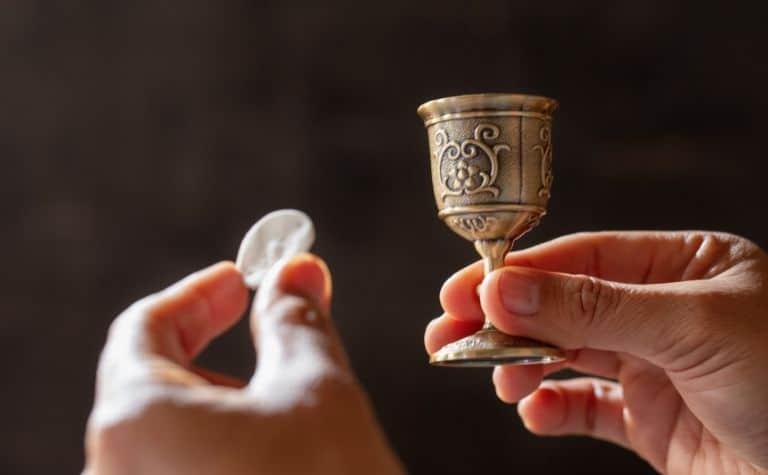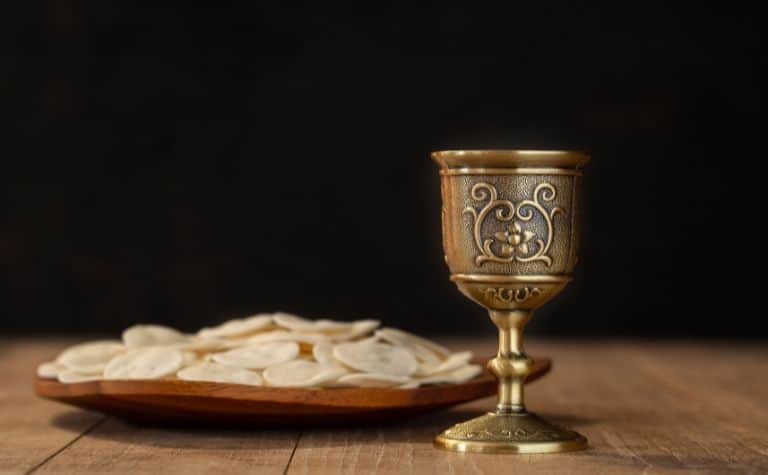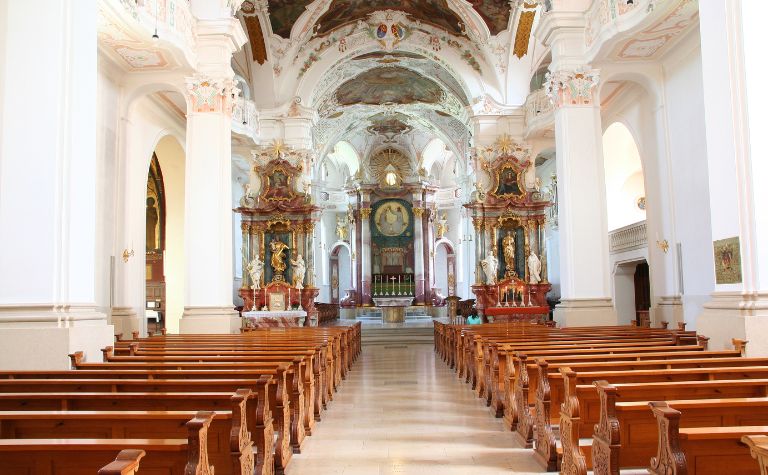Those with Catholic family or friends often wonder if they can attend Mass with their loved ones. The Catholic Church says everyone is welcome to participate if they act respectfully and follow specific guidelines. Overall, anyone can attend a Catholic Mass.
You can attend a Catholic Church without being a Catholic, but you won’t be allowed to participate in the Eucharist. Only those who have completed the First Holy Communion sacrament and are currently in a state of grace can receive it. Non-Catholic visitors can participate in everything else.
Many churches often have many non-Catholics attending their Mass. So, those who want to attend to learn more about the Catholic religion are welcome to do so, but they should be somewhat familiar with the proceedings before going.
Also, see Can Anyone Go Into a Catholic to Pray? to learn more.

What Do You Wear to a Catholic Church?
There are no regulations for clothing when attending a Catholic Church. However, the clergy and other Catholics expect attendees to dress appropriately and modestly. A person’s knees and shoulders should have clothing over them.
This general rule applies to both men and women, so it is perfectly acceptable for women to wear pants while visiting a Catholic Church.
For many people, black dress pants are the best option. While most Catholics consider jeans to be too casual, some people do still wear them.
Overall, attendees should dress appropriately for the venue, such as Business Casual, which includes clean clothes that don’t have holes or stains.
Many Catholics also prefer to wear nice shoes, such as flats or heels. Today, Catholic Churches expect attendees to prioritize attending over clothes, so they will understand if someone comes dressed casually rather than dressed up.
Can You Take Communion in a Catholic Church if You Aren’t Catholic?
If a visitor isn’t a Catholic, they can’t take the Eucharist, as doing so would be very disrespectful. The Catholic Church has many specific rules regarding who can receive the bread and wine.
Catholics are the only people who are permitted to receive the Holy Communion. They need to follow some additional rules, including being free of grave sin and having completed at least one hour of fasting before receiving the Sacrament.
Those who have committed a grave sin do not take the Eucharist without attending a confession.
Many Catholics regularly attend confessions to ensure they can still receive the Eucharist at Mass.
Additionally, couples who live together are not permitted to participate in the Sacrament since they violate the Church’s rules.
Also, see Catholicism and Cremation: What Are the Rules? to learn more.

When You Can’t Receive Communion at Church
A visitor can take two different actions at a Catholic Church when they can’t receive the Eucharist.
Some people prefer to stay in the pew. Many people will kneel and say a small prayer while waiting for the rest of the congregation to receive the bread and wine.
During that time, many churches also recommend that visitors not receiving communion reflect on their connection with God.
However, visitors can join the line and walk with those going to receive the Eucharist. When they reach the front of the line, they should cross their arms in front of themselves, which signifies that they aren’t there to take the bread. The clergy will then give them a blessing instead of the Eucharist.
The Church permits attendees to take whichever option makes them most comfortable. If they join the line, they should ensure they don’t take the bread. Sometimes, clergy will unknowingly give it to those who can’t technically receive it.
When attending a Catholic Church for the first time, it would be best to sit back and observe the proceedings. That way, they can get an understanding of how Communion goes.
What Happens If a Non-Catholic Takes Communion?
Nothing specific happens if a non-Catholic receives the Eucharist. It happens more often than one might realize, as no one checks who can and can’t receive the bread and wine at the door. However, it is considered disrespectful to the Church if someone does this.
Based on 1 Corinthians 11:29-30, the Catholic Church teaches that those who take the body of Christ when they shouldn’t, become weak or even sick.
While many people take the Eucharist often without a second thought, the Bible warns against doing this.
Many people often take the Eucharist to not appear rude. However, taking the Eucharist is a much worse offense if one is not Catholic or has sinned.
Many people remain seated during the Sacrament, so it is not rude not to receive the bread and wine.
Also, see Why Do Some Protestants Convert to Catholicism? to learn more.

Why Non-Catholics Can’t Accept Communion
Many non-Catholics wonder why they aren’t allowed to have the Eucharist. Being denied the bread and wine doesn’t mean they aren’t loved within the Church. Taking the Eucharist is a sign of complete belief that they are receiving the body and blood of Christ.
That reasoning is why the Church doesn’t want anyone who hasn’t received the First Communion to accept it.
They may have different beliefs regarding the bread and wine, as other faith groups offer the elements but don’t believe them to be the body of Christ.
Overall, the Church doesn’t deny the Eucharist to exclude non-Catholics; instead, it is a way to protect their beliefs. Many people don’t realize they accept Christ’s body during Mass.
Some non-Catholics also aren’t familiar with the rules surrounding bread and wine. They may have eaten earlier or taken the bread back to their pew with them.
While they don’t mean to be disrespectful, they aren’t aware of the proper way to handle the body of Christ in a Catholic Church setting.
Many Churches are open to taking questions. While most Catholic Churches will not allow non-Catholics to take the Eucharist, other denominations are open to giving the bread to their entire congregation.
Conclusion
Anyone is welcome to attend the Catholic Church. However, everyone should remain respectful. They can do this by dressing modestly and not accepting the Eucharist.
Related Questions
Catholic vs. Protestant vs. Orthodox: What's the Difference?
Roman Catholicism, Protestant Christianity, and the Eastern Orthodox Church are the three historical branches of the Christian religion. Each tradition traces its doctrines and practices to the New...
Roman Catholicism and Lutheranism, part of the Protestant tradition, are two of the most prominent branches of the Christian religion. Many people find it interesting to compare and contrast...
